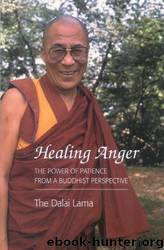Healing Anger: The Power of Patience From a Buddhist Perspective by The Dalai Lama & Thupten Jinpa

Author:The Dalai Lama & Thupten Jinpa
Language: eng
Format: azw3, mobi
Publisher: Snow Lion
Published: 1997-03-25T00:00:00+00:00
Q: If the goal is to get rid of emotions, or be free of emotions, how can we feel compassion? Isn't compassion an emotion?
A: You might be interested in hearing about a discussion I had with some scientists. We were talking about how one would define emotion. In the end we all agreed that even at the stage of Buddhahood, we can say that there are emotions. So from that point of view, one could definitely say that compassion is also an emotion.
Emotion is not necessarily something negative. Within emotion, there is both destructive emotion and constructive emotion. So what we should do is eliminate the destructive emotion.
Q: Is it possible for a professed Christian to also take a Buddhist vow? 1 am a very committed Christian, indeed an ordained person, and yet there seems a compatibility and congruence in my understanding of the teaching of Jesus and that of the Buddhist path of spirituality which would allow assent to both, and practice of both Buddhism and Christianity, as they are pointed toward light, the path of truth, love, and freedom. One of the teachers in my life has been Thomas Merton, a Catholic priest and monk, and a practitioner of Buddhism.
A: Of course, there are many common elements among all major world religious traditions. Therefore, I believe, at the initial stage one person can practice both Buddhism and Christianity simultaneously, and perhaps some other religions as well. I think this is very good.
But the question is when one reaches further. Then it is like in the field of education: when one becomes a specialist, then one has to choose one particular field. In the further practice of Buddhism, when one reaches a certain stage, the realization of emptiness is one of the key aspects of the path. The concept of emptiness and the concept of an absolute Creator, I think, are difficult to put together. On the other hand, for the Christian practitioner, the Creator and the acceptance of the Creator as almighty, is a very important factor within that tradition in order to develop self-discipline, compassion, or forgiveness and to increase them in one's intimate relationship with God. That's something very essential. In addition, when God is seen as absolute and almighty, the concept that everything is relative becomes a little bit difficult. However, if one's understanding of God is in terms of an ultimate nature of reality or ultimate truth, then it is possible to have a kind of unified approach. Then if we try to make a new interpretation, the concept of Father, Son and Holy Ghost, I think might be compared to the sambhogakaya, nirmanakaya, and dharmakaya, the three kayas. However, once one begins to interpret the Trinity in terms such as the three-kaya doctrine, then whether that practice truly remains Christian becomes quite questionable.
Download
Healing Anger: The Power of Patience From a Buddhist Perspective by The Dalai Lama & Thupten Jinpa.mobi
This site does not store any files on its server. We only index and link to content provided by other sites. Please contact the content providers to delete copyright contents if any and email us, we'll remove relevant links or contents immediately.
The remains of the day by Kazuo Ishiguro(8981)
Tools of Titans by Timothy Ferriss(8369)
Giovanni's Room by James Baldwin(7330)
The Black Swan by Nassim Nicholas Taleb(7111)
Inner Engineering: A Yogi's Guide to Joy by Sadhguru(6785)
The Way of Zen by Alan W. Watts(6601)
Asking the Right Questions: A Guide to Critical Thinking by M. Neil Browne & Stuart M. Keeley(5762)
The Power of Now: A Guide to Spiritual Enlightenment by Eckhart Tolle(5760)
The Six Wives Of Henry VIII (WOMEN IN HISTORY) by Fraser Antonia(5504)
Astrophysics for People in a Hurry by Neil DeGrasse Tyson(5182)
Housekeeping by Marilynne Robinson(4436)
12 Rules for Life by Jordan B. Peterson(4299)
Double Down (Diary of a Wimpy Kid Book 11) by Jeff Kinney(4261)
Ikigai by Héctor García & Francesc Miralles(4247)
The Ethical Slut by Janet W. Hardy(4243)
Skin in the Game by Nassim Nicholas Taleb(4239)
The Art of Happiness by The Dalai Lama(4125)
Skin in the Game: Hidden Asymmetries in Daily Life by Nassim Nicholas Taleb(3993)
Walking by Henry David Thoreau(3953)
